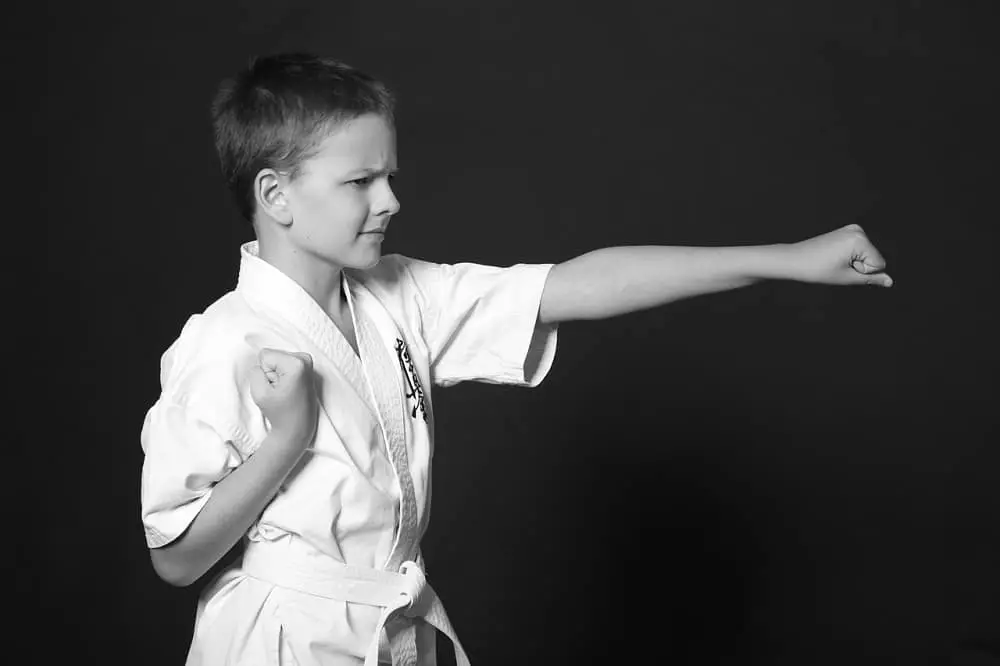Parents are often skeptical about whether or not karate and other combat sports are appropriate for their children. They often associate these activities with violence and aggression, but there are, of course, fears about the child getting hurt as well.
While these are legitimate concerns, I would argue that the pros far outweigh the cons.
Is karate good for kids? The short answer is YES, absolutely! The truth is that karate can be incredibly beneficial for kids in the short term, as well as the long term.

The rest of the article will explore some of the reasoning behind this, but we’ll also look at some of the downsides to balance things out.
Table of Contents
What Makes Karate Beneficial?
Physical activity, in general, is beneficial for kids, but with technology being so advanced, people can often get by without doing a lot of it. That’s why it’s important to make the choice to be physically active.
Not every kid is drawn to a traditional sport, such as baseball or football, and karate offers somewhat of a different experience. Apart from physical activity, some of the benefits include:
- Improved Focus. Being successful in karate requires a lot of focus, and these classes can help free a kid of distractions. Most karate classes don’t have loud music or TVs, so it’s all about focusing on the craft.
- Self-discipline. One of the main difference between karate and some other physical activities is the emphasis on discipline. Karate classes are often strict, with clear rules and boundaries. Excessive talking and messing about will not be tolerated by the instructor.
- Self-confidence and respect. One of the core values of karate is building self-confidence through the physical art, as kids learn to understand they can handle themselves in difficult situations. Another core value of karate which in my opinion equally as important, is the time spent teaching kids about the importance of respect. Kids are taught to respect teachers, parents, each other, and themselves.
- Healthy conflict resolution. The goal of karate isn’t to teach kids how to fight necessarily. In fact, karate classes often make it a point to teach kids about healthy conflict resolution, as opposed to just using their karate skills to take down opponents.
- Self-defense. That being said, self-defense is obviously a major advantage. As much as you want your kid to avoid confrontation altogether, it’s not always preventable.
Of course, there are also the short-term and long-term health benefits of taking karate classes. They’ll get to burn excess energy, and karate can increase circulation, balance, strength, and flexibility.
Karate Can Be Great for Children with Learning and Attention Issues
Karate is great for releasing excess energy.
Often, kids are mistakenly diagnosed with ADHD when they really just need to release the built-up energy, and doing this on a regular basis can often result in an overall calmness.
For some kids, increasing physical activity and reducing the amount of time spent indoors can actually improve academic performance over the long term. If you combine that with karate’s teachings in focus and stillness, it’s a great experience overall.
Karate focuses on individual growth, as opposed to team competition. Receiving a new karate belt, for example, is a concrete goal that a child can attain often without ever competing against another person.
It’s less about winning and losing and more about improving your skills for the sake of self-improvement.
Not only is karate an outlet for excess energy, but it’s also a safe outlet. It’s a very controlled environment with clear expectations for behavior.
What Is a Good Age to Start?
The earlier you start, the more these benefits will be realized. Also, if you instill these values in your child early on, they can hopefully retain them as they get older.
Believe it or not, children actually start taking karate classes as young as three years old. Many karate instructors have programs that are designed specifically for kids of this age. They will also provide your child with the necessary skills they need to successfully integrate with the next class.
You can, of course, enroll your child whenever you feel comfortable, but the longer you wait, the more difficult it can be for them to learn and integrate with their age group.
Are There Any Downsides?
Naturally, there are some downsides to karate classes, but my advice would be to weigh the pros and cons as objectively as you can.
Sometimes, kids may develop a false sense of security or get over confident in their ability to throw punches or kicks. Although, this can potentially be avoided. It depends a lot on the teacher and what they teach.
But, that’s also another downside. Not all karate instructors are good, and if you get a lousy instructor, it can be a bad experience for the child.
Conclusion
Overall, karate can be an excellent path for children. In fact, I’ll go a step further and say all respectable martial arts are great for children’s growth!
The sport is frequently more focused on self-improvement as opposed to winning, and your child will learn a lot of positive values, such as self-confidence, discipline and healthy conflict resolution.
It’s a great outlet for kids with excess energy or attention issues, and as long as you have a good instructor, your kids are sure to learn and develop in a way that benefits them for the long term.